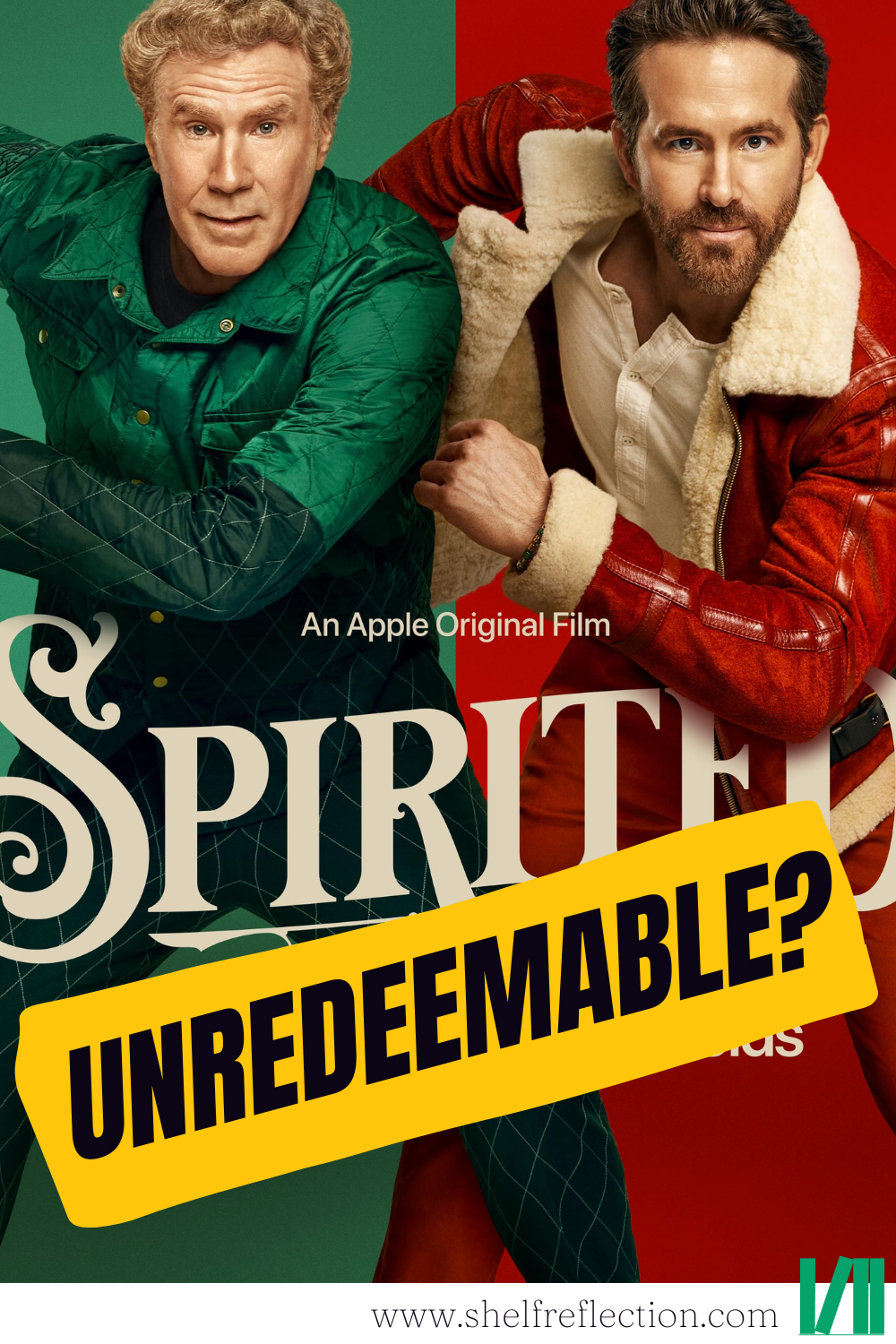Spirited: Unredeemable?
Photo Cred: Apple via Google Images
Spirited: Unredeemable?
By: Brittany Shields
My husband and I decided to start our Christmas cheer (somewhat) early and on Friday went to see the new movie ‘Spirited’ starring Will Ferrell and Ryan Reynolds.
As the movie says of itself, it’s “another adaptation of A Christmas Carol that no one asked for.” And this one is an (adult) comedic musical with a heart-warming message: people really can change!
With a cast featuring Ferrell, Reynolds, Octavia Spencer, and Tracy Morgan, the film has a lot going for it. It has a lot of good lines, a nod to Elf, and sporadic but appropriate questions of- ‘Are you really going to sing again?’ (I’m also hoping for a sequel that’s just footage of Ferrell and Reynolds learning all the choreography!)
The movie, though a musical, does ask some creative questions: What if Jacob Marley’s past, present, and future ghosts are part of an ongoing business that haunts a new ‘Scrooge’ every year? What if the Ghost of Christmas Present (GC Present) is in the middle of his own ‘life crisis’? What if the haunted and the GC Present become BFFs?
And most poignantly, ‘Spirited’ asks: Are we unredeemable?
GC Present (played by Ferrell) discovers that the man he wants to haunt and bring life change to (played by Reynolds) is actually labeled an ‘unredeemable.’ He is described, right or wrong, as a mix of “Mussolini and Ryan Seacrest.”
Unredeemables are people who are so far gone in their selfishness and rudeness and overall jerk-iness that there is no hope for them to change.
But GC Present is determined to reach him.
We eventually find out that Ferrell’s character is so invested in changing Reynolds’ character because he wants hope for himself. He was once an unredeemable and he wants to know that it’s possible he really could be changed too.
In the song ‘Unredeemable’ Ferrell sings, “Can I ever overcome all the wrongs I’m running from? Can my worst be left behind? And do I deserve to find the kind of love that I could lean on every day?”
On their journey of self-realization both GC Present and Clint (Reynolds) encounter opportunities to do good or bad. (Let the records show: Hollywood admits internet bullying is bad and social media is largely contrived.) It’s harder to do the right thing than they thought.
But finally— in classic form— when Clint sees how his choices affect other people he is moved to take a better path.
He ushers us into the climactic and enthusiastic give-everyone-a-turkey moment as the dancers twirl and Reynolds and Ferrell harmonize the supposedly uplifting, happy, and hopeful note— the moral of the story: Yes! We can change! There is hope for us! People are indeed redeemable!
Sounds great, right?
But it begs the question: ‘How?’
HOW can we change?
Spirited provides the world with this very culturally popular solution. All you have to do is work harder and try more!
Even though Clint seems to have changed magically overnight, one of the flash mob scenes reminds us that change takes time.
The closing song called ‘Do a Little Good’ says, “Do a little good, do a little more. Work a little harder than we did the day before. If you try to do what’s right you’re on the right track.”
In some ways this is right. Each day we have choices to make— to do good or not. But there is something achingly missing about this message.
We can go around with our friends singing happy songs with jazz hands and sick tap dance moves about how we can work harder and do more, but the enthusiasm fades. Day after day the challenge of selflessness slams against our desires, our plans. Our failures continue to pile up and our good works seem to pale in comparison.
Or maybe we see our good outweighing our bad but it does nothing to extinguish the doubts we have that it’s not enough. Because what if it’s not? Are we willing to face that possibility?
What if we’re not enough? How much is enough?
Cheery songs and dance numbers can only distract us from reality for so long. Eventually, when we are left with our own thoughts and reflect on our own lives, Spirited’s inspiration just doesn’t seem sustainable.
When we are beaten down by life or feeling deeply the guilt and consequences of our choices, is it really hope to be told it’s up to us to lift ourselves up from that? As Alisa Childers says, “It’s physically impossible to pull ourselves up by our bootstraps.” And spiritually it’s impossible too.
In reality, Spirited’s solution is a burden. It doesn’t loosen Marley’s chains, it binds them tighter.
So is ‘Spirited’ unredeemable?
I don’t think so. Aside from the fact that it is pretty entertaining and funny (though it does have some adult content) the movie reminds us to do good. It encourages people to climb out of their fatalistic hopelessness and despair.
It’s not unredeemable if it’s a catalyst to truth-seeking and hope-finding.
I don’t expect Hollywood to present the gospel, but it was surprisingly clear watching this movie that they ask the right question and expose our desire to truly know the answer; how important it is to us— are we unredeemable?—and yet, they undoubtedly take a wrong turn and give the exact wrong answer.
The gospel message is that we are all Scrooges in our hearts— deep down we know this. We are selfish. It’s hard for us to choose good, especially when it costs us something. And love always does.
But we cannot save ourselves.
We read in Ephesians: “God, being rich in mercy, because of the great love with which he loved us, even when we were dead in our trespasses, made us alive together with Christ… For by grace you have been saved through faith. And this is not your own doing; it is the gift of God, not a result of works, so that no one may boast.”
We need a Savior.
And the real hope we have is that Jesus died to redeem a seemingly unredeemable people. And beyond saving us, he sends us the Holy Spirit who works in us to change us. Who enables us to do good.
The fruit of the Spirit— love, joy, peace, patience, kindness, goodness, faithfulness, gentleness, and self-control— are called the fruit of the Spirit because they are produced by the Spirit, not us.
Working harder, doing more is work-based theology and contrary to everything the Bible says.
But praise God that our redemption is not conditioned on how much good we do. We could never do enough.
They sing, “There’s humanity to save… we could achieve something miraculous if we only dare.”
Salvation is not achieved, it is received. We are not miracle-workers, God is.
And he wants us to stop striving to save ourselves and to recognize our Scroogeness, to recognize that we are unredeemable without Christ. And then to surrender to him and accept freedom from the endless grind of working out our own miracles.
They sing, “Even if you lost your way, you don’t have to stay a lost cause.”
It’s true.
You are not a lost cause. If you come to the cross, you will find your redemption and the perfectly unconditional love you crave and have failed to find anywhere else on earth.
The song ‘Unredeemable’ continues: “All the worth I thought I earned; it turned worthless in the end. What was it for? Is it possible I was meant for something more?”
Everything we try to achieve on our own is worthless.
That may not sound like Christmas cheer, but the excitement of Christmas is celebrating the birth of our Savior. Who loves us. Who redeems the unredeemable.
We were created for something more. To worship the real miracle worker who frees us from our bondage to being good enough, to doing enough.
Merry Christmas all you Scrooges! Be visited by the Holy Spirit this season and though you’ll see your inadequacies, you’ll also find unconditional love, lasting joy, and real change.
Share this post to social media!


